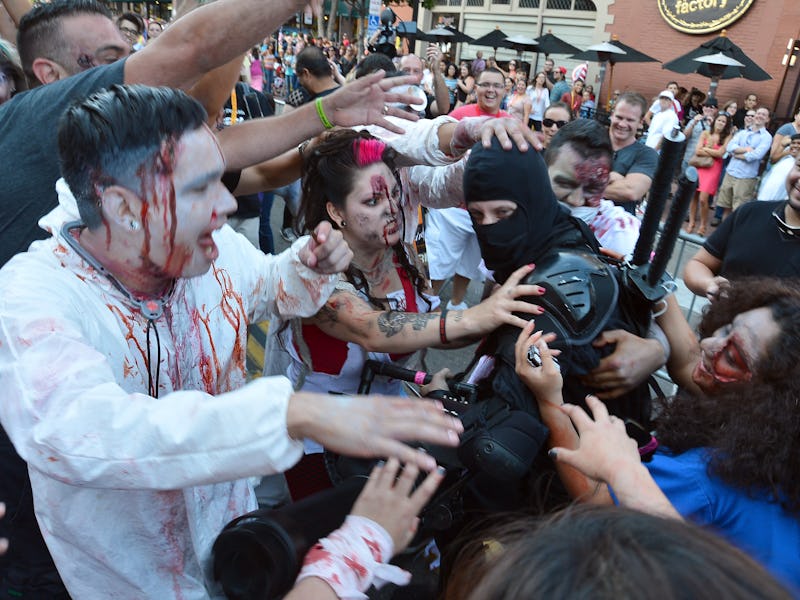How We Can Eradicate 'Comic-Con Flu'
Everyone expects to get sick at conventions. Here's how we could prevent the next outbreak.

You’re home after a whirlwind weekend at Comic-Con. You’re in bed fatigued, sore, coughing, and wheezing like an early-stage carrier from 12 Monkeys. You’re not just exhausted from wicked partying with fellow super dorks, you’re also sick. Sorry, but you’ve got “con flu.”
Not actually the flu, “con flu” or “con cough” is what convention-goers call the cold that often follows a weekend at Comic-Con and similar such events. It’s gross enough on its own, yes, but the fact that it has a name? It’s a real thing. Attendance at conventions can reach hundreds of thousands of people: jammed into the same great hall like tadpoles, all shaking hands, reaching for collectibles. Many of these people are children, walking Panzer tanks of germs.
Getting a lil’ ill is to be expected. Still, doing something to prevent another IRL demonstration of germ theory would be better than nothing.
It’s up to attendees to ensure they’re loaded on vitamin C, getting friendly with hand sanitizer, keeping their fingers out of their nose-holes. But with 155,000 people packed together, it’s low odds that everyone is being so cautious. Instead of forcing habits, can attendees be encouraged to practice better hygiene? In the way that, say, hospitals do?
Upwards of 130,000 people attend San Diego Comic-Con. That's 130,000 people carrying all kinds of germs.
Jonathan Gips is the CEO of General Sensing, a health care solutions company specializing in maintaining sanitary habits in hospitals. He’s not a Comic-Con regular, but he was hardly shocked when I told him about “con flu,” the sort of thing his company tries to shut down.
Take General Sensing’s MedSense, a nifty clip-on device that interacts with special bottles of hand sanitizers. If a doctor fails to use it, MedSense buzzes as a reminder. And for good reason: the Center for Disease Control and Prevention in 2011 counted 75,000 fatalities from healthcare-associated infections (among them, communicable diseases) while hospitalized.
No one should expect conventions to give out thousands of expensive badges to attendees that buzz when they don’t sneeze into a Kleenex, but that isn’t the point of the device. Education, Gips argues, is the best preventer.
“I think maybe there could be some kind of official messaging,” Gips tells me by phone. “Something that can be shared on posters or communicated in a regular way so that people might be able to remember.” Gips recalls off-hand healthcare workers who are given reminders or little buttons to wear that say “Ask Me About My Hand Hygiene.”
It might seem silly to have hospital-style PSA posters at Comic-Con, but it’s a crowd that’s used to stern lectures. Sexual harassment has been a major problem in the geek scene — ask literally any woman in the industry — and women cosplayers at conventions are often cat-called or groped. In 2014, ReedPOP, the organizers of New York Comic-Con, set up prominent “Cosplay Is Not Consent” signs along with its unambiguous anti-harassment policies. The move was lauded online and by people at the convention.
Did it work? Hard to say, but building a culture of respect has to start somewhere. Like protecting people’s health, it’s a long-term play, not a short-term fix.
Why do doctors — the first people who would tell you to wash your hands — need hygiene reminders anyway? Short answer, they’re too busy and too distractible. “They’re often trying to juggle many things at the same time,” Gips says. “Sometimes doctors and nurses have things in their hands. They might be entering a room and they have nowhere to put something that they’re holding to stop and perform hand hygiene.”
In this fashion, they’re not bad proxies for convention geeks. Comic-Con is a bonanza of giveaways, novelty knickknacks, limited-edition throwaways, and giant collectibles, which can blindside attendees who didn’t bring proper baggage. People load themselves down. Plus, they’re at Comic-Con. It’s practically a theme park. Who has time to clean their hands when there’s replica Doctor Who merch to check out?
The MedSense, with its buzz reminder, isn’t premised on negative reinforcement. Rather, it’s about information. “Having a system like ours, we can give them data-driven insights that they wouldn’t have any other way to get,” Gips says. “Our kind of system works on that premise by basically giving better information and also reminders.”
So it comes down to education and nagging. Why not take it one step further and appeal to geeks in a way they know best? Despite not identifying with the scene, Gips offers the usefulness of games themselves. “Some of the things we’ve done are providing incentives, so gamifying things,” he says. “That might work in the context of Comic-Con. Giving little gifts or things for people that you catch actually performing hand hygiene.” A free Walking Dead Funko figure for every Purell station used? At the rate those little things go for, that could eliminate disease in the entire Eastern Seaboard.
Until that happens, fellow Comic-Con attendees, the best way for us to stay healthy is to spread the word: Sneeze into your elbow, wash your hands on your way out of the bathroom, and sanitize whenever you think about it. Feeling like reheated crap on Monday is no game.